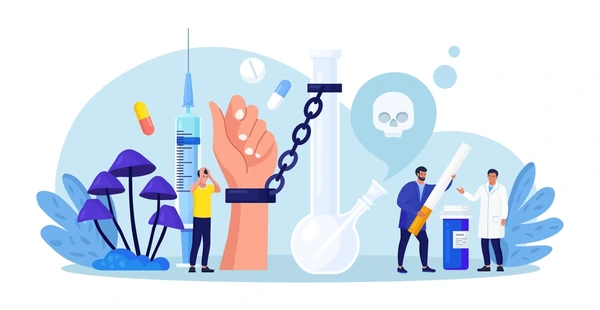In our fast-paced world, it’s common to recognize bad habits—whether it’s excessive screen time, poor eating, or substance use. But when it comes to addressing them, many of us fall into the trap of simply curbing those habits without truly diving into recovery. The distinction between curbing bad habits and fully committing to recovery is significant, and understanding this difference is essential if you want to make real, lasting change in your life.
Curbing Bad Habits: A Temporary Fix?
Curbing bad habits is often seen as the easier, more immediate solution. It’s about minimizing the impact of a negative behavior without necessarily addressing its root cause. For example, cutting down on junk food or reducing alcohol consumption may seem like progress, but these changes can be surface-level if you don’t examine why those habits formed in the first place.
Recovery: The Path to Long-Term Change
Recovery, on the other hand, is about more than just modifying behavior. It’s about healing the underlying issues that fuel those behaviors and committing to a process of self-growth and transformation. Whether it’s recovery from addiction, emotional trauma, or any other harmful pattern, the process requires dedication, vulnerability, and time.
One of the primary problems with just curbing bad habits is that it tends to be a short-term fix. You might see some improvement, but without deeper reflection or intentional effort, old patterns can easily return. This approach often leaves individuals feeling like they’re spinning their wheels—putting in effort but not seeing meaningful or sustainable results. While curbing habits is a step in the right direction, it can sometimes be a way of avoiding the real work that recovery requires.
Recovery forces you to confront the reasons why you developed a bad habit in the first place. It’s not just about stopping the behavior; it’s about understanding the emotional, psychological, and sometimes physiological reasons behind it. In the case of substance abuse, for example, recovery involves not just quitting the substance but also addressing mental health, environment, and triggers that can lead to relapse.
Unlike curbing bad habits, recovery demands accountability. It’s a holistic process that often includes seeking support from professionals, attending therapy or support groups, and actively participating in self-reflection. This commitment to recovery allows for deeper, more permanent changes to take place, rather than simply masking the problem.
Why Taking Recovery Seriously Matters
Taking recovery seriously is the only way to ensure that you’re not wasting your time. Half-measures and quick fixes can offer temporary relief, but they rarely lead to lasting change. Without committing to recovery, you’re likely to continue cycling through periods of improvement followed by relapse, which can be discouraging and disheartening.
Moreover, recovery is crucial for overall well-being. When you address the root causes of harmful behaviors, you create a stronger foundation for both your mental and physical health. You’re not just avoiding harmful habits—you’re actively cultivating positive ones that contribute to a fulfilling, balanced life. This long-term approach to recovery is essential for growth, resilience, and personal development.
Wasting Time: The Risks of Half-Hearted Efforts
Not committing to recovery can lead to frustration and burnout. Trying to curb bad habits without fully addressing the underlying causes can feel like a never-ending battle, and this constant struggle can deplete your energy and motivation over time. In essence, half-hearted efforts can lead to wasted time and even worsen feelings of guilt or inadequacy.
On the other hand, by taking recovery seriously, you’re investing your time and energy into building a healthier, more empowered version of yourself. The rewards—emotional stability, better relationships, and increased self-confidence—are well worth the effort.
Conclusion
In our fast-paced world, it’s common to recognize bad habits—whether it’s excessive screen time, poor eating, or substance use. But when it comes to addressing them, many of us fall into the trap of simply curbing those habits without truly diving into recovery. The distinction between curbing bad habits and fully committing to recovery is significant, and understanding this difference is essential if you want to make real, lasting change in your life.
Curbing Bad Habits: A Temporary Fix?
Curbing bad habits is often seen as the easier, more immediate solution. It’s about minimizing the impact of a negative behavior without necessarily addressing its root cause. For example, cutting down on junk food or reducing alcohol consumption may seem like progress, but these changes can be surface-level if you don’t examine why those habits formed in the first place.
One of the primary problems with just curbing bad habits is that it tends to be a short-term fix. You might see some improvement, but without deeper reflection or intentional effort, old patterns can easily return. This approach often leaves individuals feeling like they’re spinning their wheels—putting in effort but not seeing meaningful or sustainable results. While curbing habits is a step in the right direction, it can sometimes be a way of avoiding the real work that recovery requires.
Recovery: The Path to Long-Term Change
Recovery, on the other hand, is about more than just modifying behavior. It’s about healing the underlying issues that fuel those behaviors and committing to a process of self-growth and transformation. Whether it’s recovery from addiction, emotional trauma, or any other harmful pattern, the process requires dedication, vulnerability, and time.
Recovery forces you to confront the reasons why you developed a bad habit in the first place. It’s not just about stopping the behavior; it’s about understanding the emotional, psychological, and sometimes physiological reasons behind it. In the case of substance abuse, for example, recovery involves not just quitting the substance but also addressing mental health, environment, and triggers that can lead to relapse.
Unlike curbing bad habits, recovery demands accountability. It’s a holistic process that often includes seeking support from professionals, attending therapy or support groups, and actively participating in self-reflection. This commitment to recovery allows for deeper, more permanent changes to take place, rather than simply masking the problem.
Why Taking Recovery Seriously Matters
Taking recovery seriously is the only way to ensure that you’re not wasting your time. Half-measures and quick fixes can offer temporary relief, but they rarely lead to lasting change. Without committing to recovery, you’re likely to continue cycling through periods of improvement followed by relapse, which can be discouraging and disheartening.
Moreover, recovery is crucial for overall well-being. When you address the root causes of harmful behaviors, you create a stronger foundation for both your mental and physical health. You’re not just avoiding harmful habits—you’re actively cultivating positive ones that contribute to a fulfilling, balanced life. This long-term approach to recovery is essential for growth, resilience, and personal development.
Wasting Time: The Risks of Half-Hearted Efforts
Not committing to recovery can lead to frustration and burnout. Trying to curb bad habits without fully addressing the underlying causes can feel like a never-ending battle, and this constant struggle can deplete your energy and motivation over time. In essence, half-hearted efforts can lead to wasted time and even worsen feelings of guilt or inadequacy.
On the other hand, by taking recovery seriously, you’re investing your time and energy into building a healthier, more empowered version of yourself. The rewards—emotional stability, better relationships, and increased self-confidence—are well worth the effort.
Conclusion
The difference between curbing bad habits and embracing recovery is the difference between a temporary fix and a long-term transformation. If you’re serious about creating lasting change, it’s important to approach your challenges with a recovery mindset. Commit to the process, seek support when needed, and be patient with yourself. Real change doesn’t happen overnight, but by taking recovery seriously, you’re ensuring that your time and energy are used to create lasting, meaningful improvements in your life.

